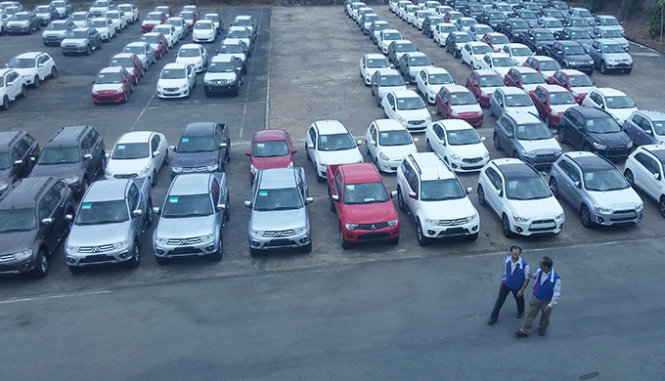The automotive industry in Vietnam is facing a collapse after Toyota has announced that it may stop assembling automobiles in the Southeast Asian country, considering future cuts in taxes on ASEAN vehicles.
>> An audio version of the story is available here
ASEAN stands for Association of Southeast Asian Nations, including Indonesia, Malaysia, the Philippines, Singapore, Thailand, Brunei, Cambodia, Laos, Myanmar, and Vietnam.
According to the road map of the ASEAN Free Trade Area (AFTA), automobiles under ten seats imported from ASEAN countries are entitled to a 50 percent rate this year. The rate will be cut to 40 percent next year, 30 percent the following year, and 0 percent in 2018.
As a result, after forecasting market trends and changes in the import tariffs, many automobile manufacturers have started moving away from assembling to importing since last year.
Locally assembled vehicles are getting more expensive
During a visit to the office of the Vinastar automobile joint venture (VSM) specializing in the production of Mitsubishi vehicles in Thu Duc District, Ho Chi Minh City this April, Tuoi Tre (Youth) reporters found that the parking area accommodated around 200 imported automobiles, whereas there were very few Pajero Sport cars, which were domestically assembled.
Talking to Tuoi Tre, Kazuhiro Yamana, VSM general Director, said his plant, which assembled many kinds of cars in the past, now only assembles Pajero Sport cars with a capacity of about 100 units per month.
In its heyday, the VSM’s plant churned out 410 vehicles each month. However, as business strategies are changing, the VSM has reduced the capacity of the plant.
In fiscal 2014, which started in January 2014 and ended in March 2015, the joint venture sold 2,530 vehicles, including 1,660 vehicles, or 65.6 percent, imported from Thailand and Japan.
VSM is a member of the Vietnam Automobile Manufacturers' Association (VAMA) with the highest ratio of imported cars.
Even when import tariffs increase, they said the price of completely built units (CBUs) will be still cheaper than locally assembled vehicles, which will consequently result in better sales.
"Our goal is to calculate how to fetch vehicles at the lowest price to sell, either CBUs or locally assembled automobiles. Due to various reasons, the five types of CBU we have imported for re-selling in Vietnam are much more affordable than assembled domestically," Yamana said.
Yoshihisa Maruta, president of Toyota Motor Vietnam, said at a meeting to announce the company’s operation plans for 2015 on April 2 that the Japanese carmaker could cease making automobiles in the Southeast Asian nation and import them from other ASEAN countries to enjoy the zero percent import duty in 2018.
Toyota Motor Vietnam currently has to import most of the spare parts for its production in Vietnam, Maruta said, adding that there will soon come the day when importing a complete car from Thailand is cheaper than assembling it domestically.
The Japanese president, who is also chairman of the VAMA, said the year 2018 will be a milestone for the carmaking industry.
The VAMA still does not know if the Vietnamese government will have any kind of supportive policies for specific kinds of car so that its members can focus on producing such specific automobiles for the local market, he said at the meeting.
According to calculations by automobile manufacturers, the price of vehicles assembled in Vietnam is averagely 2.5 times higher than that of their counterparts in other ASEAN countries.
The reason why the price of domestically produced vehicles is too high, reducing their competitiveness as compared to imported automobiles, according to Yamana, is the "weird" calculation of special consumption tax which applies to the production or importation of specific goods and the provision of certain services.
While the tax rate for CBUs is worked out on the basis of the CIF price inclusive of manufacturing, insurance and freight costs, that for locally assembled vehicles is calculated based on the price at which an automobile is sold to the dealer, including business profits, freight charges from the place of production to the agent, and some other expenses such as advertising.
"This methodology of tax calculation makes the price of domestically produced cars at least five percent costlier than CBUs,” he added.
In addition, the risk of a total halt will not only stem from the intention of automotive businesses, but also from consumers’ demand for imported cars, as those CBUs offer them more convenience at a cheaper price.
Rising demand for CBUs
After a long time learning how to drive and joining the test drives of several 4-seat automobiles assembled domestically, V.T., a local customer living in Cau Giay District, Hanoi has decided to buy a Mitsubishi Attrage CVT imported from Thailand at over VND600 million ($27,600).
"After I’ve tested many locally assembled cars of some friends, I feel this imported car is more comfortable and more spacious for utilities such as DVD players with touch screens, leather seats, push-start buttons, smart keys, and fuel economy at a quite affordable price," he told Tuoi Tre.
Recently, foreign-made cars have attracted a larger number of local buyers who think that they have better quality than domestically assembled counterparts.
The General Statistics Office (GSO) of Vietnam in late December last year reported that the Southeast Asian country spent $1.57 billion on importing 72,000 vehicles, up 103.8 percent and 117.3 percent in volume and value compared to 2013.
Both the imported volume and value of foreign-made vehicles were the highest rates ever, the GSO said.
Like us on Facebook or follow us on Twitter to get the latest news about Vietnam!


















































